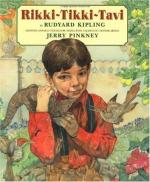|
This section contains 467 words (approx. 2 pages at 400 words per page) |

|
"Rikki-Tikki-Tavi" enjoyed unwavering success as a children's story well into the early 2000s, by which time it was considered a classic and appeared in numerous editions and anthologies.
Kipling himself was the subject of criticism since he began publishing in his early twenties. His receipt of the Nobel Prize in 1907 was met with wide approval from the general readership with which he was immensely popular and dismay by the literary world. He was perceived by the literary establishment as a writer of verse, rather than of poetry; the simple style of much of his prose was considered little more than entertaining; over the decades many found his blunt, straightforward politicizing both unrefined and offensive.
The English poet T. S. Eliot, however, years after Kipling's death, found value enough in his verse to publish a newly edited collection in 1941; in his introductory essay he defended Kipling's abilities...
|
This section contains 467 words (approx. 2 pages at 400 words per page) |

|




